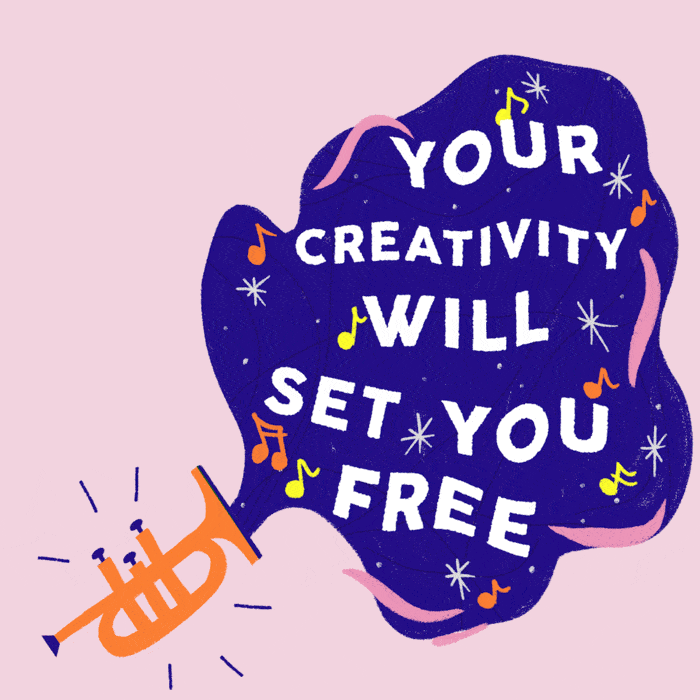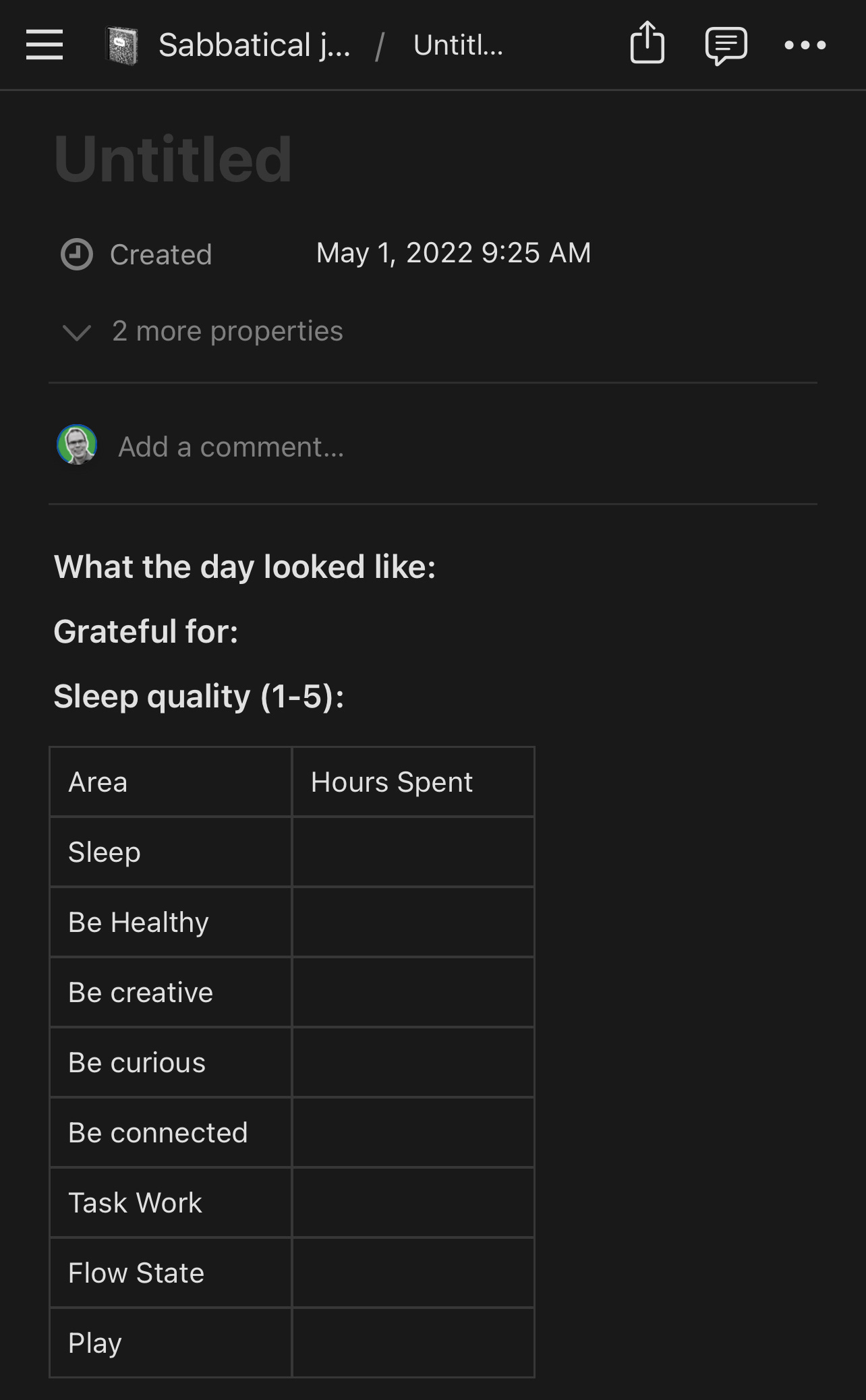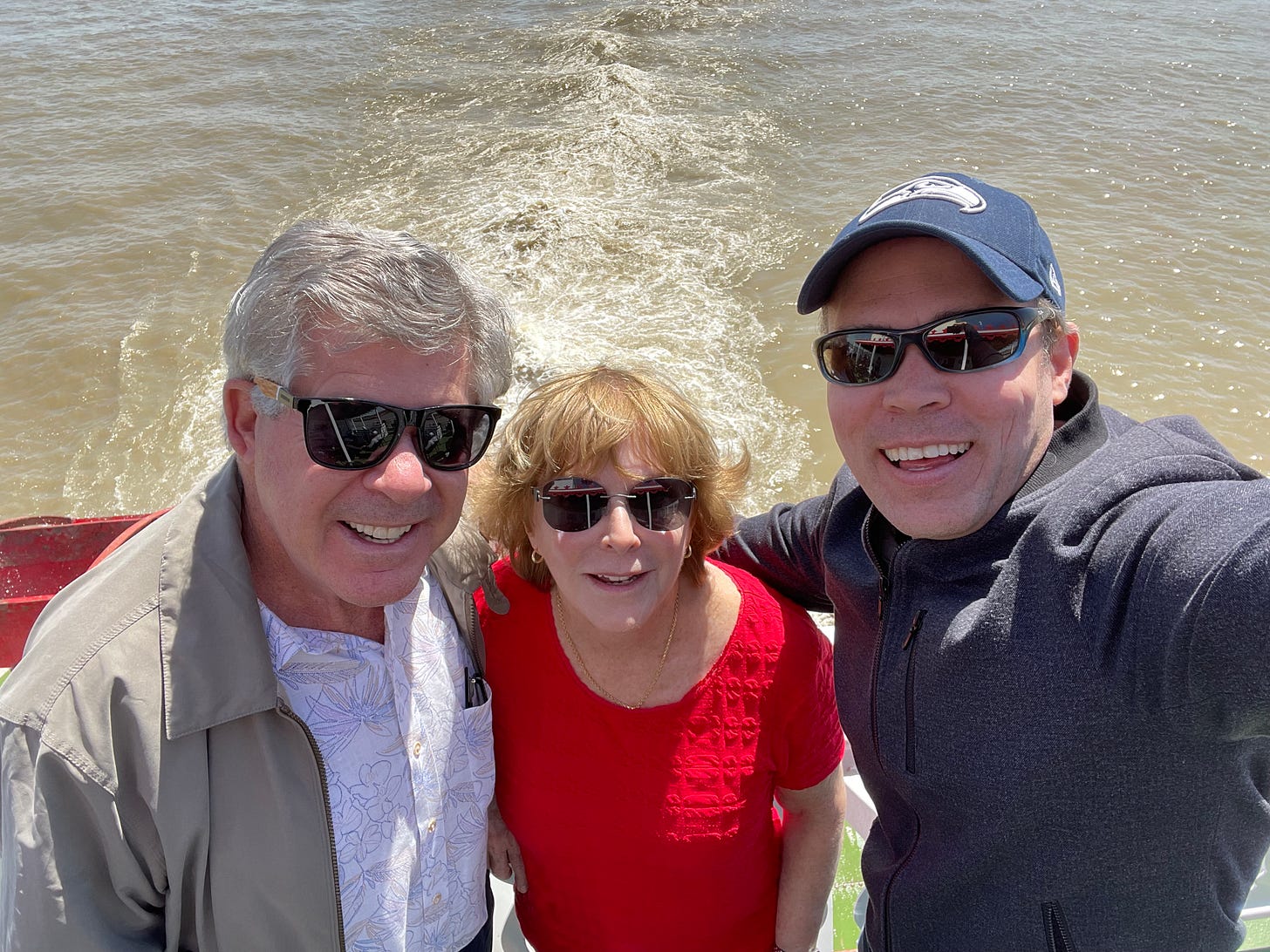Adam's Field Guide to Happiness: The Secret to Amazing Paid Time Off 🏖️🏃♂️🧘♂️
How I recharged while also making permanent changes to my happiness
This is it. My magnum opus. The post that has given me the most joy to write. After a recharge week in 2021 & summarizing pandemic-forged mental health strategies & focusing my pursuits from mastery to purpose & my recent 70-day sabbatical, this is everything I know about how to recharge and savor my time away from the office.
This post is for anyone contemplating some time away from work - from an afternoon away to a recharge week to a full-on sabbatical. It’s designed around the concepts of savoring, Flow, gratitude, embracing play, and being present. It explores the best way that the halo of happiness extends well after the return to work.
Before we begin, you should get in the right headspace: this guide is designed around maximizing your own happiness and giving you space to explore what YOU need. We’ll layer your team, your boss, your loved ones, and others and their needs too as we go on. We all have important ways people are depending on us; this guide gives you the grace to also focus on yourself.
Did you give yourself that permission? Great!
I’ve organized this post into three chapters: Pre-Launch, During The Break, and Reentry - with 3-4 tips for each chapter.
Let’s go!
🚀Pre-Launch: Before You Start
There is no need to wait to reap the benefits of your time off until the day it begins. You can extend the value of your time off by savoring it beforehand with some pre-thinking. But how much preparation should you do for your time off? How do you plan without over-constraining yourself?
1. 🕰️ Decide on a clock speed
Are you stepping away from work? Or are you really just stepping away from the concept of intensity? Or perhaps you just want more autonomy but your gut is telling you “Get Stuff Done” is still a required part of the recharge? Here is a very simple guide:
For my recharge week in 2021, I set the dial right in the middle. I wanted to incorporate some giving and donations into my week (Get Stuff Done) and I also wanted to step away and relax (a metaphorical beach).
For my 70-day sabbatical, I hit the dial hard to the left. That was more about fundamentally resetting my approach to intensity and creating new durable mindfulness habits. My burning desire to create TODOs lists was like a little devil on my shoulder that I needed to keep in check.
There is no right or wrong – but being intentional helped me be more creative about the time and the act of deciding gave me power.
2. 📜 Create a menu, not a list of commitments
If you create a list of commitments you want to get done, you are setting yourself up for grief at the lost opportunity at the end of your time off when you don’t get it all finished.
Instead, try a menu of options.
For my sabbatical, I tried 4 big themes with options within them. My four themes were:
I figured these out ahead of time based on who I know I am and where I want to go. I then tried them on during the time off to see what fit. Here are the details on each:
💪Be Healthy: Both mind and body. Meditation, long-distance running, health gadget exploration, supplements.
The gift I hoped to give myself: I’m turning 40 this year and want to be in the best shape of my life for it.
✒️Be Creative: For me, that’s writing. I had a couple book ideas in the hopper, and one book I’m in the middle of molding.
The gift I hoped to give myself: I’m exploring durable creative passions outside of work as part of my larger purpose.
🤔Be Curious: Reading history, exploring Masterclasses, trying new things like surfing.
The gift I hoped to give myself: Academia was one of the things I mastered best in my early life. I am bringing back into my life a spirit of learning and a love of history.
🤗Be Connected: Connecting in new ways with people I’m close to. Taking fun trips.
The gift I hoped to give myself: My personality recharges by being alone, yet so much of what enables joy and savoring is enhanced by being around others.
Each of these were aligned to an outcome – but not to be achieved by the end of the time off. Instead, I created themes of what I wanted to get done over the next year or even decade.
3. 📚 Ask people what to read and listen to
I find an empty content queue stressful. Instead of being curious or relaxing, I’m hunting. I get a deep sense of satisfaction when I have a list of podcasts, books, and audiobooks at the ready before my time off begins.
I’ve found this is a great task to crowdsource - people wanted to help me recharge and this enabled friends to be part of my experience with a book recommendation or new app to try.
Here are a few recs from me:
Some really great Science Fiction: Mind benders & page turners
Three great non-fiction books to understand what’s going on in 2022
4. 😍 Check in with your spouse and loved ones
This might be the time in your life when you are on a different schedule and mindset wavelength with a significant other than any other period. Let that sink in for a moment.
I decided to name and tame that before my sabbatical began. Helen worked during my sabbatical – indeed, she’s thriving at a growth-stage startup in a critical role at the company. Both our kids were in school. This was a different situation than almost anyone else I’ve talked to who has taken a sabbatical; most took the time when the rest of their family could snap to it. I kept up my share of the running of the household even as I replaced work hours with my sabbatical pursuits. Helen and I had an intentional conversation about this – she was incredibly supportive of ensuring I got what I wanted out of the break. On the flip side, I didn’t “disappear” for 70 days; quite the opposite - the point was to be more present.
At the end of the day, we needed to work together to rebalance with an intentional awareness of the circumstances. This is something that has been a huge theme in our 10+ years of marriage:
🙏 During The Break: Achieving Zen State
If you are committed to this next break feeling more restorative than any you have taken before, the key is to look inside yourself, not at external stimuli. It doesn’t matter what you do and where you go - it matters that you can work your mindset. This is just another muscle to train and here are my tips on how to get there.
1. 🏖️ Embrace Kairos time: Being in the moment
Stay with me here – this is one of the most important concepts to understand. The Ancient Greeks had two concepts of time: Chronos and Kairos. Chronos is our ordinary concept of time – regimented and organized by a clock, it’s a linear progression. In Chronos time, the clock rules you. Kairos is about being in the moment and using judgment and awareness to not miss the most expedient course of action. It’s nonsequential and is more creative, engages more parts of the brain, and is more recharging. Kairos time seems plentiful; there is no hurry. Being in Kairos time is a way of fully enjoying a pause, being creative on a project, or reflecting.
Other cultures have these dual concepts of time – Japanese culture has Ichi-go ichi-e (roughly translated as “being in the moment”) or conversely Kala is a Sanskrit word used to represent time as the unmovable destroyer of all things.

The best moments in my time off were Kairos time: my unbounded morning coffee and reading time when I no longer had a place to be next, being in the flow of writing such that I don’t know how long I was doing it, or becoming totally present with my youngest daughter as I took her skiing instead of sending her to school. My number one piece of advice for an extended time off: don’t wear a watch. ⌚
Protip: Kick off a break without going anywhere: It was my first two weeks of sabbatical where I embraced Kairos the most - before I started traveling. I’ve taken to calling these first two weeks my “stay-battical,” time spent at home focused on transitioning into recharge mode.
2. 🍬 Avoid junk food recharges. Live the value of healthy mindfulness and don’t worry about the habit yet.
Before I started my sabbatical, I fantasized about the time I would spend binging Netflix. However, until I ended up getting on an airplane for a long flight many weeks into the sabbatical, I didn’t watch one episode of TV. I spent the time being curious to learn about something new, practicing new mindfulness techniques, or long-distance running.
It’s not that Netflix or scrolling social media is bad, and give yourself the grace if that’s where Kairos time takes you at first. But if you are really embracing Kairos and being in the moment to figure out what will give you the most joy, you can almost always find something more refreshing than binging. If you are listening, that is.
One of the issues I really struggled with as I replaced brainless TV with mindfulness is that it’s way frickin’ easier to practice mindfulness when you have few distractions in your life. There was no way I was going to build a permanent mindfulness habit unless I was practicing during my full work time. Would any of this practice pay dividends over the long term?
My approach here was to overfill my cup finding value in the practices. I tried to leave myself with an indelible impression that I’ll remember. This motivated me upon my return to get back to that anchor point, even as there was hard work to do to incorporate it into my regular routine.

Protip: If these notions of mindfulness and Kairos time and savoring moments are intimidating, I can’t recommend enough Dr. Santo’s free Coursera class on the Psychology of Happiness. It’s like a warm hug to your mental wellness. Dr. Santos explains to you what you already feel but couldn’t articulate - what science says is key to sustained happiness. She gives an overview of the field of Positive Psychology - how science can help relatively healthy and well-adjusted folks vs. focusing on pathologies - and it is chock-full of wonderful little nuggets of wisdom.
One of the things that brought me the most joy was hearing my kids ask “What did you learn about happiness today?” at the dinner table and I could share some study or insight that was approachable to them.
3. 📰 Keep a Journal and Time Card
Here’s how I spent my time on my sabbatical across my major menu themes per week:
In this, I can see when I focused on my book pursuits or did a travel week or the constant drumbeat of my marathon training. I’m super proud of this memento from my time off. It’s just as precious as the photo albums and ticket stubs.
It’s a pain to journal. I’ve started the habit before only to fall off the wagon. But I stuck with it throughout my entire sabbatical. Not only did it help me capture the time for future-me, but it helped me process the big and small moments. It was a daily reminder to work on building my mindset muscle and was a mark of how time passed for me.
Here is the Notion template I used for journaling during my sabbatical:
Flow & gratitude & play + my core themes of health, curiosity, connection, and creativity were just enough self-reflection on how I spent my time without creating guilt over progress.
4. 🤗 Trips with special people are more important than special places
Yes, we went on several family trips together as an entire family during my sabbatical. They were awesome. But I also took each of my daughters on a 1:1 trip. Helen and I explored Seattle on a “play hooky” day. I traveled to New Orleans with just my parents.
Many people use time off or extended sabbaticals to do a mega-trip with their family. It’s a great idea and there is a reason it’s common. It is a pre-packaged reset of the schedule and priorities and since the entire family comes along, it removes many constraints that come from existing routines.
There’s no wrong answer, but I appreciated the diversity of configurations to whom I was with. I also think had I done the mega-trip, the awe of the travel itself would have left me more on auto-pilot about my mindset - my approach created intentionality.
I’m glad I stretched myself around whom I was with as much as where I was going.
🔥 Reentry: Reintegrating with the Normals
One of my proudest moments of the year is that I had zero grief when my sabbatical ended and it was time to return to work. It was the closing of an epic chapter but it was time to move forward. I was eager to apply my new mindset at work, rebalance with my family, and harvest what I learned about myself. It felt different than most other vacations in that I felt prepared for what was coming instead of sad about any time lost.
I have had grief in my first three weeks of being back to the routine as putting my ideas into practice fell short of my hopes. It’s hard to reintegrate and this is where practicing your mindset in the middle of a busy life is difficult. Many people have reminded me to give myself a lot of grace during this period and I am - it’s a crucible, not a single moment of magic.
Here are my thoughts on reintegration so far:
1. ⚠️ Be prepared for shocks different than what you feared
Everyone who has taken extended time off always told me “Good luck with the reentry!” often accompanied by a sly smile. I was curious what I was getting myself into but wasn’t really sure.
My experience was that it was very easy to pick back up with the details of the work. I work on a product called SharePoint and I joked to people that upon my return, I remembered that the P was capitalized. My knowledge of the state of play and product wasn’t rusty. That reduced a fear I had significantly.
Secondly, it took about 2.5 weeks, but readjusting to the pace and intensity level was doable but required a build-up. Upon the advice of my boss, I eased back into things. It was almost like an extra week of time off – a liminal state where you get to immerse yourself in the pace and flow but take no accountability yet. That really helped with that form of shock.
What surprised me the most and gave me the most culture shock was the influx of negativity and tradeoffs back into my life. I went 70 days with zero negativity in my life during the sabbatical. At work, don’t get me wrong, not all negativity is bad. Some of it certainly is (as a colleague told me recently, that’s what the money is for), but saying “this isn’t good enough” or “your team needs to grow in this way” is an essential part of the creative process. This is the area where I completely lost my thick skin and needed to regrow it.
2. 😊 You can be a new you. Give yourself a motto upon your return.
Part of the joy of an extended break was that I got to be intentional about how I showed up to people upon my return. There was an easy narrative that there was a “New Adam” and I got to write for folks the role I wanted to play.
I wrapped up all my newfound love of mindfulness with where I needed to grow as a leader into this pithy statement:
I talked about the details on this LinkedIn post (hey – if you click through that, do me a favor and follow me on LI!). The mantra reminded me why I’m here (do hard things), how I want to show up (in a calm way), and gets me focused on partnering with others again (with me).
3. 📅 Plan the next break
You will find a newfound love of breaks and time off. What before was a nice-to-have will feel like, at the end, a required part of how you grow. Take time in your final days off to plan your next break. 2-4 months from the end of the current one is a great rule of thumb. It’ll give you something to look forward to and I guarantee, if you’ve embraced Kairos time and are therefore being more creative and in the moment, it will certainly be something you naturally gravitate towards wanting to do.
🌌 Wrapping Up
In The Hitchhiker’s Guide to the Galaxy, they build a giant machine and spend thousands of years to figure out the answer to life, the universe, and everything: It’s 42. The kicker is: what’s the question?
No field guide can provide that. Stepping away from intensity, finding newfound creativity in Kairos time, and resetting your own self-worth by not focusing on delivery, outcomes, and TODO checklists has got to be part of the equation, though. It’s much larger than just how to spend some time off but delves into an experiment in internal and intrinsic motivation vs. external pressures. It’s a lot harder to figure out what you really want vs. serving the needs of something or someone else. Guess there is a reason Douglas Adam’s book cover says “Don’t Panic.”
Do hard things in a calm way with me.












